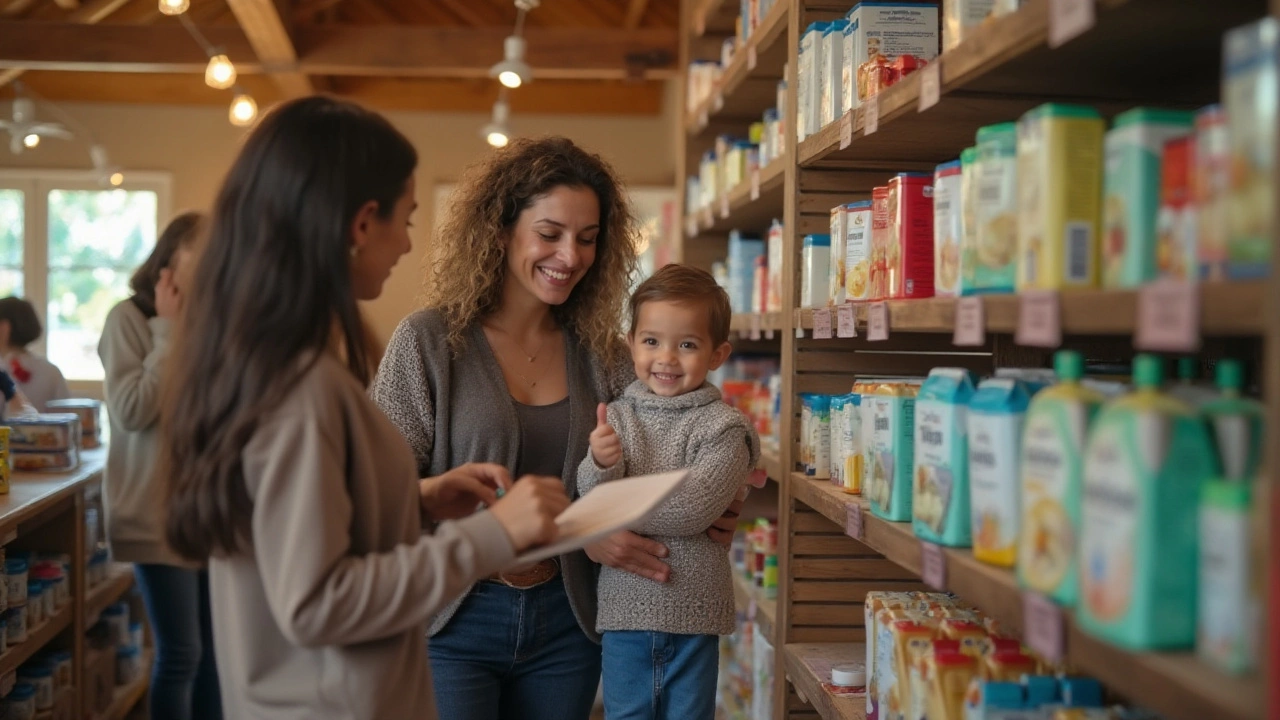
When an unexpected shortage of baby formula arises, even the calmest of parents can feel a rush of panic. It's crucial to know where to turn and what steps to take to ensure your little one has the nutrition they need. This guide aims to shed light on immediate solutions and resources available to secure baby formula during emergencies.
We dive into various avenues from local stores and pharmacies to expanding your search online, and even tapping into community networks for support. You'll also find sensible advice on how to be better prepared for the next time and ensure a steady supply of formula, no matter what challenges come your way.
- Understanding Formula Shortages
- Local Stores and Pharmacies
- Online and Delivery Services
- Community Resources and Support
- Emergency Preparedness Tips
Understanding Formula Shortages
In recent years, the challenge of securing baby formula during shortages has made headlines and added a layer of stress for many parents. These shortages can occur due to a mix of factors, including disruptions in the supply chain, increased demand, or even product recalls. Just like any other commercial product, the path from manufacturing to the local store's shelf is fraught with potential obstacles. It's vital for parents to stay informed about these dynamics to better navigate times of scarcity.
One major disruption can occur at the production level. If a factory has to shut down for maintenance or faces delays due to regulatory concerns, this can significantly impact the available supply. For instance, there were noted intermittent shortages when the significant formula producer, Abbott Laboratories, faced issues at their manufacturing facility in Sturgis, Michigan, which raised concerns across the world. Additionally, global events, such as shipping blockades or health crises like the COVID-19 pandemic, further exacerbate these problems by slowing down distribution and increasing costs.
The demand side also plays a crucial role. A sudden increase in birth rates or changes in societal preferences towards bottle feeding can cause spikes in demand that manufacturers may be unprepared to meet. It's not just an issue of producing more; companies must also manage logistical hurdles to deliver to widely dispersed locations. Moreover, panic buying fueled by rumors of potential shortages can lead many to stockpile, further straining already limited supplies.
Import restrictions and tariffs have also impacted the market. Different countries have their specific regulations regarding the import of baby formula, making it sometimes difficult for retailers to source products internationally during local shortages. For example, stringent labeling requirements or safety standards can delay or restrict the availability of international brands in some markets.
"Supply chain issues have become a recurring theme in our discussions," noted Professor James Harrison, an expert in global supply management at the University of Bristol. "It's crucial for consumers to understand how interconnected and vulnerable these chains are, especially for essential items like baby formula."
In understanding formula shortages, it's useful for parents to keep abreast of current events and not hesitate to ask retailers about their forecasted stock levels. In some communities, parents have started forming groups to share resources and news about formula availability. This communal approach can provide a lifeline and reduce the stress associated with shortages.
Local Stores and Pharmacies
In the midst of a baby formula emergency, one of the first ports of call should be your local stores and pharmacies. These establishments often have the most straightforward solution to finding baby formula quickly. Their shelves are typically stocked with a variety of formula brands, catering to the diverse nutritional needs of infants, whether it's for cow's milk-based formulas or soy alternatives. If you find yourself in need, it's wise to call ahead to check availability before making the journey, saving precious time and energy.
Many larger supermarket chains have now implemented services like inventory checks via their websites or apps. This means you can see what’s in stock at your closest branches without having to leave your home. It’s worth remembering that during emergencies, such as widespread supply disruptions or panics, these stores may impose purchase limits to ensure that all families have access to formula. Engaging the help of store employees can be beneficial; they might offer insights into when the formula is restocked or suggest alternatives if your preferred brand is unavailable.
Pharmacies can also be an excellent option in these situations. They often carry special formulations that aren’t commonly found on supermarket shelves, catering to infants with specific dietary needs or allergies. Establishing a good rapport with your local pharmacists can be a boon, as these medical professionals often have access to professional networks that can secure hard-to-find items. Their insight can be crucial, especially in understanding how different formulas might impact your baby's health.
"Amidst a formula shortage, understanding the supply landscape can equip parents with the knowledge to make informed decisions," says a representative from the British Nutrition Foundation.Another tip is to inquire if your local pharmacy offers home delivery services, which can be a lifesaver when venturing out isn’t feasible. Often, pharmacies will work with parents to ensure that a steady supply is maintained, particularly for those with standing prescriptions that require fortified formula for medically fragile infants.
During unprecedented shortages, some smaller independent stores and corner shops might divert from their usual inventory patterns, stocking essential items to meet community needs, baby formula included. While their selections might be limited compared to bigger chains, these local businesses are embedded within the community and can sometimes offer personalized assistance. If you frequent a corner shop regularly, speaking with the shopkeeper could reveal unexpected insights about formula availability.
When local search yields no results, staying connected with neighborhood groups on social media can be useful. Sometimes, community members may share real-time updates about store supplies or tips about hidden gem locations that might still have formula in stock. Such digital word-of-mouth is invaluable during times of crisis, emphasizing community spirit and resilience. As you navigate local resources, bear in mind the importance of acting calmly yet swiftly — the goal is to secure nutrition for your little one without succumbing to unnecessary panic or stress.

Online and Delivery Services
In today's digital age, the convenience of getting baby formula delivered directly to your doorstep is often just a few clicks away. Online shopping platforms have become an indispensable resource, especially in emergency situations where time and availability are crucial. Many large retailers like Amazon, Tesco, and Boots offer same-day or next-day delivery options that can be life-savers for desperate parents. Importantly, these services often come with tracking features, allowing you to monitor the progress of your order and plan accordingly. When you've run out of formula and the thought of a late-night drive to the store is overwhelming, exploring these online avenues can alleviate a lot of stress.
One significant advantage of purchasing baby formula online is the plethora of choices typically available. Unlike physical stores, which might face immediate shortages during unexpected demand spikes, online platforms often have larger inventories due to their network of warehouses. They can offer a variety of brands and specialized formulas catering to different dietary needs, from lactose-free options to those enriched with specific nutrients. This diversity ensures that even amidst stocking challenges, you can find the right nutrition for your baby. Additionally, many of these platforms maintain robust customer service teams. In cases where a particular formula might not be instantly available, they can assist in finding suitable alternatives or provide notifications when restocks occur.
It is also worth noting the growth of niche services that cater specifically to infant needs. Subscription services like Yumi or Little Spoon not only provide organic formula options but also deliver them on a personalized schedule that fits your consumption patterns. Such services are designed with convenience in mind, reducing the likelihood of ever running out unexpectedly. According to a recent report, more than 60% of parents have turned to such subscription models in the past year, finding peace of mind in their consistency and reliability.
"The advent of online delivery has transformed parenting," says parenting expert Emily West. "It’s not just about convenience but also ensuring that parents have uninterrupted access to essential supplies."
Although the convenience of online services is appealing, becoming adept at navigating these platforms is crucial. Start by setting up accounts with multiple trusted online retailers to quickly compare prices and availability. Leverage online and delivery services to build a balanced stockpile; aim to have a month's supply at minimum and use your online orders for replenishment rather than emergency purchase only. This approach can prevent you from facing shortages during peak demand periods. Additionally, staying informed about bulk purchase options and promotions can save you both time and money. Keep your notifications on for price drops or restock alerts, which can be pivotal during periods when emergency formula is in high demand.
Lastly, during crisis times, it is prudent to consider community-driven platforms. Websites like eBay or Facebook Marketplace sometimes offer baby formula, often from parents who wish to help others in their neighborhood. While engaging in such exchanges, exercise caution: verify product integrity and expiration dates, and prioritize platforms with good refund policies or buyer protection measures. These safety steps ensure your child's nutritional needs are met without compromising safety. Remember to frequently review and engage with parenting forums and networks, as they can also suggest reliable online services based on collective experiences and shared recommendations.
Community Resources and Support
Navigating the world of community resources can be a lifesaver in times when baby formula is scarce. One of the most reassuring aspects of living in a community is the often unseen network of support that can come into play during emergencies. Many parents are surprised to discover the wealth of resources available right at their doorstep, all aimed at ensuring infants receive the nutrition they need without interruption. Local food banks, parenting groups, and community centers often have stocks of baby formula specifically designated for emergency situations. They're usually more than willing to assist, though it's essential to communicate your needs clearly and promptly.
Reaching out to non-profit organizations, for instance, can yield surprising results. Many of these organizations maintain a specific reserve of formula to support families in crisis. It's worth noting that social media platforms host various community groups that specialize in connecting parents with essential supplies, including formula. The power of real-time communication means you might find what you need faster than any other traditional method. A single post in a community group can quickly spread, bringing offers of support from unexpected quarters.
Another underexplored angle is tapping into the network of local health services. Many healthcare professionals, from pediatric nurses to midwives, have insights into networks that provide direct access to essential supplies during emergencies. Interestingly, some pharmacies and clinics collaborate with these health services to ensure they have formula stocks reserved for critical needs. These partnerships are cumbersome, but they offer vital lifelines during unexpected shortages. Communication with health professionals can also lead to recommendations for alternative formulas, which can be crucial if a particular brand is unavailable.
Let's not overlook religious organizations and community centers that often host outreach programs aimed at new parents. They might not only offer emergency formula but also provide support and advice tailored for new families. Sometimes, these organizations hold regular donation drives for baby supplies, ensuring they have a stockpile ready for urgent demands. It's also worth mentioning that such avenues often come with the added benefit of forming connections with other local parents, fostering a sense of solidarity and shared experience.
According to parenting expert Dr. Emily Carter, having a plan in place can significantly reduce stress during times of shortages. She says,
"Parents who proactively connect with community resources often navigate formula shortages more successfully. It's not just about having supplies; it's about having a support network."Dr. Carter's insights remind us that engaging with local groups is not simply a way to secure necessary supplies but also a means to build resilience and confidence. In essence, the communal approach to tackling emergencies not only ensures physical needs are met but also nurtures a robust emotional support system for parents.

Emergency Preparedness Tips
Being ready for emergencies is an essential aspect of modern parenting, particularly when it comes to ensuring the availability of baby formula. Preparing ahead can significantly reduce stress and ensure that infants continue to receive their vital nutrition without interruptions. We all know that situations can change rapidly, and having a plan in place is crucial. Consider building a small stockpile of formula; a backup supply can act as a buffer during unexpected shortages or emergencies. It's recommended to have a two-week supply on hand, keeping in mind expiration dates to avoid wastage. Rotate your stock frequently by using the oldest containers first, ensuring they are still fit for consumption.
Another key aspect of preparation is identifying and keeping a list of local and online retailers known for stocking formula. This includes supermarkets, pharmacies, and specialty baby shops. Keep tabs on their stock levels and any patterns they might have during peak purchasing times, such as holidays or seasonal changes. Additionally, sign up for notifications or newsletters from these vendors to stay informed about availability. Engaging with community groups, whether online forums or local parenting clubs, can also offer insights into alternative sources and boost your network of support. During times of crisis, these networks often collaborate by sharing spare formula supplies or pooling resources.
To enhance your readiness, consider researching homemade formula recipes as a temporary measure. However, it’s critical to consult healthcare providers before introducing any alternative formula to ensure safety and nutrition balance. In a USDA study, more than 60% of parents admitted they felt underprepared for formula shortages; being informed can make a significant difference. Include emergency contact details of pediatricians or helplines in your preparedness plan. These professionals can guide you to the closest feasible solutions during urgent situations. A quote from Dr. Emily Hawthorne, a well-respected pediatric nutritionist, resonates here:
"Preparedness isn't just about having a stockpile; it's about creating a resource network that ensures no child goes without."Following such advice establishes a sense of security and readiness to face the unpredictable with confidence.

